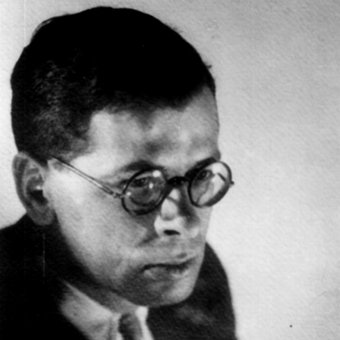
Simon Laks
Simon Laks studied mathematics in Vilnius before studying harmony, counterpoint and composition at the conservatory in Warsaw, his home town * left Poland in 1926, 1927–29 studied at Paris conservatory under Paul Vidal und Henri Rabaud * played the violin in cafés, on an ocean steamer, accompanied silent films and worked as a music teacher * key person in the association of young Polish musicians in Paris * awards and performances of early works as: Blues symphonique, Wind Quintet, String Quartet No.2 (all lost now), Cello Sonata; cooperation with the singer Tola Korian for whom he wrote numerous songs * 1941 arrested and interned in the camp of Pithiviers near Orléans, deported to Auschwitz II in July 1942 * survived the camp as a member and, later on, arranger and conductor of the camp orchestra * deportation to Dachau in October 1944 * returned to Paris after the liberation in spring 1945 * published memories of his time spent in the concentration camp as Musiques d’un autre monde in 1948 (revised Polish ed. 1979, English ed. 1989, French ed. 1991, German ed. 1998) * resumed composition, including film music under a pseudonym, while at the same time working on linguistic problems and a theory of subtitling films * almost abandoned composition after the Six-Day War in 1967, took up work as a translator and publicist * Simon Laks’ musical style is close to the École de Paris
Works by Simon Laks include
Huit chants populaires juifs (1947) for soprano or tenor and piano
String Quartet No.3 (1945)
Sinfonietta (1936) for string orchestra
Poème (1954) for violin and orchestra
L’Hirondelle inattendue (1965) Opéra-bouffe in one act
Symphony for strings (1964)
